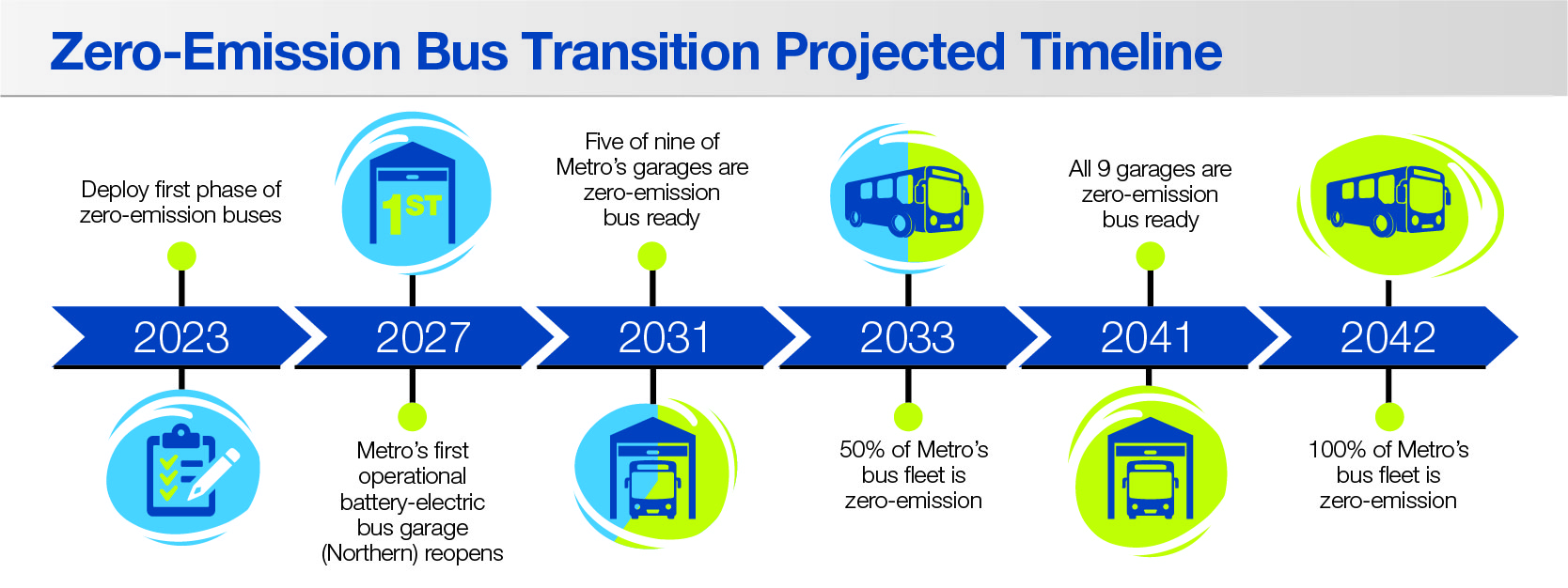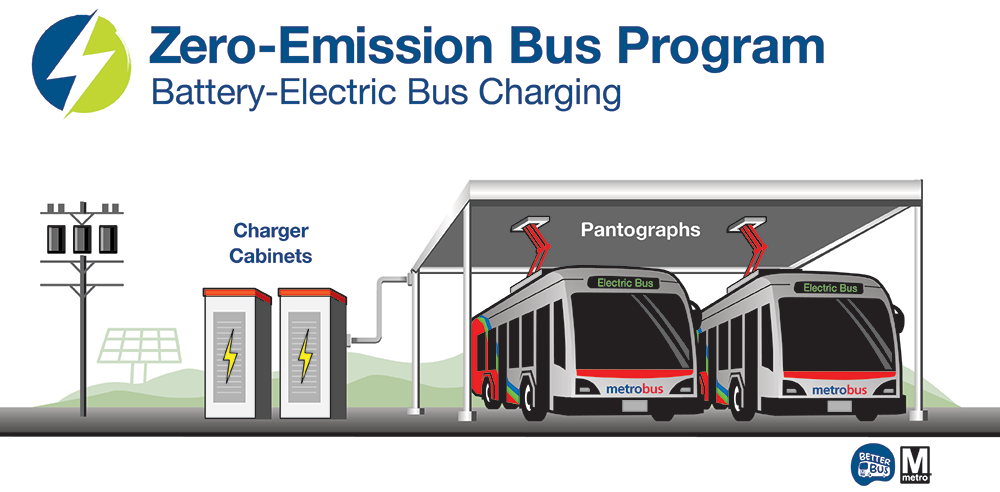Zero-Emission Buses

As part of our Better Bus initiative, Metro is transitioning to a 100% zero-emission bus (ZEB) fleet. ZEBs have no tailpipe emissions, which means improved air quality, reduced greenhouse gas emissions, and quieter buses throughout the region. We’re also modernizing our bus garages to support zero-emission operations and training our workforce to prepare for this transition.
Zero-Emission Bus Commitments
In 2023, we have made major commitments towards transitioning our Metrobus fleet including:
- Putting our first two 60-foot battery-electric buses into service.
- Releasing our first ZEB Transition Plan, which identifies a pathway to transition to zero-emissions operations by 2042
- Accelerating our ZEB goals by three years, based on initial Transition Plan:
- 100% ZEB purchases by 2027
- 100% ZEB fleet by 2042
- Announcing Northern Bus Garage will be reconstructed to operate a fully battery-electric bus (BEB) fleet.
- Committing to reconstructing Bladensburg Bus Garage with charging infrastructure and equipment to support approximately 150 BEBs and ultimately transitioning the garage to 100% zero-emission operations.
We are dedicated to continuing to provide reliable service and minimize disruptions during our transition to zero-emission operations.

Environmental Benefits
The new ZEB fleet will provide significant environmental benefits for our region. In comparison to the 2022 bus fleet, we expect a fully zero-emission Metrobus fleet will reduce greenhouse gas emissions by about 100,000 metric tons (83%) per year. These new buses will help improve air quality for our communities by reducing or eliminating emissions of particulate matter and other air pollution.
ZEB Deployment: Phase 1
The zero-emission bus technology is fairly new to the industry and is continuously evolving. Metro is launching Phase 1 of ZEB Deployments at our Shepherd Parkway Bus Division in the District of Columbia. This project includes 12 battery-electric buses and the installation of overhead pantograph chargers at Shepherd Parkway. We put the first two battery-electric buses into service in November 2023 and expect to take delivery of the remaining 10 buses starting in 2024. This initial deployment allows Metro to gain hands-on experience operating battery-electric buses and charging equipment to continue to provide safe and reliable service to our customers as we scale up this technology.

This graphic demonstrates the method of charging electric buses using an overhead pantograph charging system.
ZEB Facilities
Metro has begun to make its facilities ready to support zero-emission buses. Construction is underway at Northern and Bladensburg Bus Garages, and planning efforts are underway at Western and Cinder Bed Road Bus Garages. In June 2023, Metro received a $104 million FTA Low or No Emissions Vehicle Grant to support the conversion of Cinder Bed to a fully battery-electric bus facility along with the procurement of approximately 100 battery-electric buses for the National Capital Region.
Partnerships
Metro is working with regional partners to support the transition to zero-emission vehicles and recently launched a regional zero-emission bus working group. This group aims to improve coordination and collaboration to ensure efficient delivery of zero-emission bus services across the region. We will continue to explore opportunities to share learnings and resources with our partners and provide updates on the transition plan and safety measures.
As part of the Transition Plan, Metro has coordinated with the local electric utilities that serve our garages to explore the anticipated utility improvements needed to support the new fleets at each facility and will continue to work with the utilities to ensure power is provided to support battery-electric bus charging.
Additional Resources:
Metro’s transition to zero-emission supports one of the key pillars of Metro’s Strategic Transformation Plan – Sustainability. Review the plan to see how we’re propelling our service into the next era of transportation.
You can also check out these resources to learn more about our commitment to transitioning to zero-emission bus operations:
- ZEB Transition Plan Summary
- ZEB Transition Plan Frequently Asked Questions
- ZEB Updates
- Energy Action Plan
- Bus Garage projects: Metro is investing in upgrading our garages to support zero-emission operations.